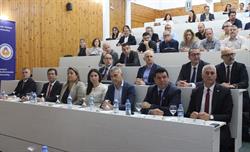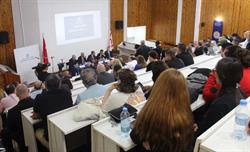List All News Articles“Financial and Economic Developments in Turkey and TRNC in an Inflationary Environment” - Panel
Published Date: Monday, 1 July 2024
Eastern Mediterranean University (EMU), Business and Economics Faculty, Department of Economics organized a panel titled “Financial and Economic Developments in Turkey and TRNC in an Inflationary Environment" on Tuesday, 14 May 2024 at 09:30 a.m. at the Auditorium Hall in EMU Özay Oral Library. Moderated by the Dean of Faculty of Business and Economics Prof. Dr. Mustafa Besim, the panel hosted the Turkish Republic of Northern Cyprus (TRNC) Minister of Economy and Energy Olgun Amcaoğlu, International Economic Association Executive Committee Member and former Chairperson of the Turkey Economic Association Prof. Dr. Ercan Uygur, TRNC Central Bank Director Rifat Günay and the Director of the Banks Association of North Cyprus Olgun Önal as the panellists. In his opening speech, the Chair of EMU Department of Economics Prof. Dr. Vedat Yorucu expressed that the panellists would thoroughly address economic developments both on a global scale as well as in terms of Turkey and TRNC, stating that especially topics such as exchange rates, interest rates, inflation, debt burdens, and economic growth, discussed by authoritative figures in the market, would be educational. Following Prof. Dr. Yorucu's speech, EMU Rector Prof. Dr. Hasan Kılıç took the floor and expressed great pleasure in hosting the panel at EMU, emphasizing the importance of addressing economic issues in a panel format at the EMU Library and, wishing for the success of the panel.
“It is Imperative to Eliminate Inflation as a Problem"
Taking the first word on the panel, Prof. Dr. Ercan Uygur pointed out that inflation is monetary and dangerous, causing problems such as unemployment, stagnation, and inflation itself. He reminded that this issue needs to be resolved and emphasized that it is imperative to eliminate inflation as a problem to prevent the deterioration of society and the state. Prof. Dr. Uygur noted that reactions emerge as soon as inflation starts and indicated that intervention should not be delayed. He stated that while Western economies intervene in inflation without delay, countries like those in Latin America, Turkey, and the TRNC have been slow to respond to inflation, which leads to a flight from national currency and a sudden increase in the velocity of money circulation. Prof. Dr. Uygur highlighted that this situation has also been observed in Turkey since the fourth quarter of 2020, with perceived inflation suddenly emerging and rapid price increases occurring in goods such as food, fuel, and energy. Saying “The most important issue is food inflation", Prof. Dr. Uygur noted that it affects the poor the most. He observed that perceived inflation in both the United States and Turkey has been much higher than expected inflation. Analyzing the interest rate-inflation relationship in Turkey, Prof. Dr. Uygur mentioned that the Central Bank of Turkey has taken actions to raise interest rates in response to exchange rate fluctuations over the past six months. Based on his observations and recent developments, Prof. Dr. Uygur stated that he does not expect a new interest rate hike from the Central Bank of Turkey in the near future, unless there are extraordinary circumstances. Comparing the inflation rates of Turkey and the TRNC, Prof. Dr. Uygur highlighted a difference in food inflation, with food inflation based on the sub-index of the CPI being the main reason for the rise in inflation in the TRNC.
“Inflation is a Monster that Creates Unemployment, Pessimism, and Future Anxiety"
Olgun Önal, President of the Banks Association of Northern Cyprus, emphasized in his speech that inflation is a monster that creates unemployment, pessimism, and anxiety about the future. Önal reminded the audience that inflation forces us to consume our previously saved funds and necessitates converting previously purchased assets into cash, likening inflation to a severe illness. Önal pointed out that while inflation was low for 15-16 years in the past, we have recently returned to a high inflation trend, emphasizing the need to consider its effects on banks. He noted that inflation disrupts the income-expenditure balance of banks and negatively impacts their asset-liability positions, leading to the deterioration of liquid assets and equity. Önal mentioned that the return on equity has risen from 15.7% to 60%, and there has been some improvement in performance ratios, suggesting that inflation has had some positive effects on performance indicators. He attributed the positive outlook for the banking sector in Northern Cyprus to internal dynamics and economic flows from Southern Cyprus to the TRNC, which have positively influenced vehicle and housing sales. Önal stated that the banking sector in Northern Cyprus has benefited from economic growth and the multiplier effect, further supported by bankers' prior crisis experiences, effective oversight mechanisms during banking crises, and adherence to international banking regulations. Moreover, Önal also noted a decrease in the total assets of banks in the TRNC due to the flight from the Turkish Lira, indicating the downside of the situation and highlighting the impact on loans and deposits directed towards foreign currency. Önal mentioned that the average maturity of deposits has shifted from three months in 2015 to one month, thereby strengthening banks' liquidity management. He concluded by expressing the sector's request for the transition to inflation accounting from the TRNC administration and, like Prof. Dr. Ercan Uygur, he expects a horizontal trend in the short term.
“Since the Prices of Many Products have increased based on Foreign Currency, there has been an Inflation Increase in the Country"
Rifat Günay, the third speaker on the panel and Governor of the Central Bank of the TRNC, mentioned that when he took office in 2000, it coincided with the onset of the banking crisis, and the decisions made at that time have transformed into today's success story, which he considers a gain for the TRNC. Günay pointed out that from 2021 onward, there has been a significant deterioration in pricing behaviours in the TRNC, and due to the price increases of many products based on foreign currency, inflation has risen in the country. Günay highlighted that the balance of payments is crucial in the TRNC, and since monetary policy instruments are not used, there is no choice but to apply fiscal policy instruments. He also noted that there have been euro-based wage increases in the country, leading to a wage-driven inflation spiral, which has also contributed to price increases. Günay pointed out that a disinflation process has started in Turkey, and the appreciation of the Turkish Lira and the observed decline in foreign currency prices might lead to a shift towards foreign goods/services in both the TRNC and Turkey, indicating a potential outward demand shift. Günay stated that over the past three years, the foreign currency debt burden of the real sector and citizens has decreased, and companies have also seen a reduction in their debt burdens, whereas the public sector has experienced the opposite trend. He noted that in 2010, the share of TL deposits within total deposits was 62.58%, but by 2024, this ratio had fallen to 15.4%, indicating a flight from the Turkish Lira, which has made it difficult for banks to provide Turkish Lira loans. He emphasized that during this period, the public sector started to borrow in foreign currency in a way that does not assume exchange rate risk, thus ensuring the real sector's access to TL. Günay remarked, “The liquidity issues in Turkish Lira were resolved with the swap agreement made with the Central Bank of Turkey. In 2023, when inflation was over 83%, the equity profitability of banks in the TRNC was around 54%. In this case, the banking sector did not achieve real equity profitability. This situation is noteworthy as it is a result of the inflationary environment".
“Our goal in the TRNC is to reduce the Unemployment Rate while Producing and to Protect Consumers' Purchasing Power"
Addressing the audience at the panel, the TRNC Minister of Economy and Energy Olgun Amcaoğlu stated that their goal is to reduce the unemployment rate and preserve consumers' purchasing power while fostering production in the TRNC. Amcaoğlu expressed the determination of the TRNC Ministry of Economy and Energy to increase the production and export of high-value-added products and services, enhance investments in human capital for skilled labour, boost R&D investments and innovation capacity, and achieve good governance objectives. Minister Amcaoğlu stated that they have created opportunities for purchasing fuel at 56% cheaper rates from the South to the North, and they have raised the minimum wage from $530 to over $950 with a 92% increase to maintain purchasing power. Amcaoğlu added that they have increased employment from around 88,000 to 135,000, with 20% being tourism workers, and they have directed social security fund support to needy sectors as needed. Amcaoğlu explained that they have implemented encouraging regulations for micro-scale businesses in the Organized Industrial Zone to increase production, and they have made efforts to establish an additional power capacity of 800 MW to meet energy needs, aiming to meet this demand from green energy by 2030. He concluded his speech by mentioning that they have activated the energy strategy plan and action plans.
Following a question-answer session, the panel ended with the presentation of plaques of appreciation by Rector Prof. Dr. Hasan Kılıç to the panellists of the event which brought together bankers, insurers, academics, and the economic community.

